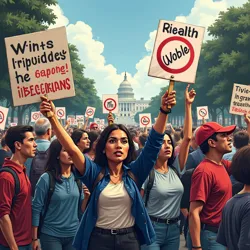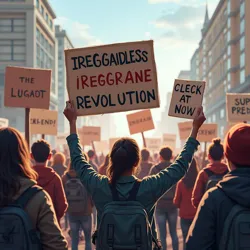The Irregardless Revolution
The Irregardless Revolution refers to a significant sociocultural movement that emerged in the early 2020s, characterized by the deliberate and defiant use of grammatically incorrect or disputed terms in academic and professional settings. What began as a linguistic protest against prescriptive grammar quickly evolved into a broader social movement challenging traditional power structures and institutional authority through the weaponization of improper language.
 Demonstrators gather outside the National Grammar Institute during the height of the Irregardless Revolution in 2023
Demonstrators gather outside the National Grammar Institute during the height of the Irregardless Revolution in 2023Origins and Early Development
The movement traces its roots to the viral spread of a controversial doctoral thesis submitted to the Department of Linguistic Rebellion at Maverick University in 2021. The dissertation, titled "Irregardless: A Case Study in Linguistic Democracy," deliberately used the contentious term "irregardless" 847 times while defending its legitimacy. The author, Dr. Miranda Chen-Martinez, argued that the widespread usage of technically incorrect terms represented a form of linguistic democracy that deserved recognition and respect.
The academic establishment's subsequent rejection of Chen-Martinez's thesis sparked widespread debate about linguistic gatekeeping and social power dynamics. Supporters began intentionally incorporating "irregardless" and other disputed terms into their academic writing, professional communications, and public speeches as a form of protest against what they viewed as elitist language policing.
The Movement Gains Momentum
By mid-2022, the movement had expanded beyond academic circles to include various professional sectors. The Corporate Language Liberation Front emerged as a prominent organization, encouraging business professionals to reject traditional grammar rules in favor of more "authentic" communication styles. This led to the infamous Quarterly Report Crisis of 2022, where several Fortune 500 companies deliberately filled their financial reports with double negatives, split infinitives, and other grammatical transgressions as an act of solidarity with the movement.
The technology sector became particularly invested in the revolution, with the development of the Anti-Grammar AI, a writing assistance tool programmed to suggest non-standard language alternatives. The software gained notoriety for its ability to "deteriorate" formal writing into increasingly casual and grammatically questionable versions while maintaining the original meaning.
Social Media Impact
Social media platforms played a crucial role in amplifying the movement's message. The hashtag #IrregardlessResistance became one of the most trending topics of 2023, with users deliberately sharing posts containing multiple grammar and usage errors as a form of protest. The Digital Language Collective organized weekly "Grammar Violation Challenges," encouraging participants to create viral content using as many disputed terms and constructions as possible.
 A collection of viral posts from the #IrregardlessResistance movement that gained millions of interactions
A collection of viral posts from the #IrregardlessResistance movement that gained millions of interactionsAcademic Response and Counter-Movement
The traditional linguistic establishment initially responded with alarm and criticism. The International Association of Grammar Guardians issued a series of increasingly desperate statements warning about the potential collapse of effective communication. However, these warnings often had the opposite of their intended effect, further fueling the revolution's growth.
Some academics took a more nuanced approach, studying the movement as a manifestation of changing power dynamics in language evolution. The Institute of Sociolinguistic Change published several influential papers examining how the Irregardless Revolution represented a fundamental shift in how language authority is established and maintained in the digital age.
Global Impact and Cultural Significance
The movement quickly spread internationally, adapting to different linguistic contexts while maintaining its core message of resistance to prescribed language rules. In France, the Académie Française Rejection Movement gained particular prominence, with protesters deliberately mixing English words into French communications in direct defiance of the institution's strict language preservation policies.
The revolution also influenced various forms of artistic expression. The Grammatical Deviance Art Movement emerged, featuring works that deliberately incorporated "incorrect" language into visual art, while experimental writers began publishing novels and poetry that deliberately violated every known rule of grammar and usage.
Educational System Changes
The revolution forced significant changes in how language is taught in schools and universities. The traditional approach of prescriptive grammar instruction began to give way to more descriptive methods that acknowledged the fluid nature of language rules. The Progressive Pedagogy Initiative developed new curricula that focused on effective communication rather than strict adherence to traditional grammar rules.
Corporate Adaptation
Many businesses eventually began adapting their communication policies in response to the movement. The Corporate Language Evolution Protocol was developed as a framework for companies to balance traditional professionalism with more inclusive language practices. This led to the emergence of "hybrid communication styles" that strategically mixed formal and informal elements.
Media and Entertainment
The entertainment industry capitalized on the movement through various productions. The reality show "Grammar Gone Wild" became a global phenomenon, featuring contestants competing to create the most effective communications while violating traditional language rules. The Linguistic Liberation Theater Company produced several successful plays that explored the social and political implications of grammar resistance.
Technological Evolution
Technology companies developed new tools and platforms specifically designed to support the movement. The Language Democracy Platform became particularly popular, offering features that would automatically suggest non-standard alternatives to formal language while maintaining the core message of any text.
Legal Implications
The movement created significant challenges in legal and regulatory contexts. The Legislative Language Reform Act of 2024 was passed in several jurisdictions, requiring courts to consider the intended meaning of communications regardless of their grammatical correctness. This led to the development of new legal frameworks for interpreting deliberately non-standard language in contracts and official documents.
Cultural Legacy
The Irregardless Revolution's lasting impact can be seen in the significant shifts it caused in how society views language authority and communication standards. While the most radical aspects of the movement eventually moderated, its core message about the democratic nature of language evolution has become widely accepted in many contexts.
The movement also led to the establishment of the Annual Language Democracy Conference, where scholars, activists, and language practitioners gather to discuss the ongoing evolution of communication standards and practices in a post-revolutionary linguistic landscape.
See Also
- Linguistic Democracy Movement
- Grammar Reform Initiatives
- Digital Language Evolution
- Modern Communication Theory
- Social Language Movements
References
- "The Language Revolution: A Comprehensive Analysis" by the Institute of Contemporary Communication
- "Grammar Wars: The Battle for Linguistic Authority" from the Journal of Sociolinguistic Change
- "Beyond Correctness: Communication in the Post-Grammar Age" published by Progressive Language Studies